| Construction Rating: | starstarstarstarstar |
| Flight Rating: | starstarstarstarstar_border |
| Overall Rating: | starstarstarstarstar_border |
| Manufacturer: | Starlight Rockets |
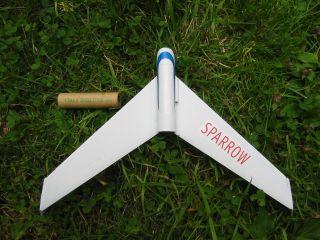
Brief:
The Sparrow by Starlight Model Rocketry is a "skill level 1" tailless
flying wing boost glider for A motors. I found this kit in a hobby shop outside
Charlotte, NC and had to get it. Retail price for the summer of 2004 was $5.95.
The rocket requires the engine to "spit", so it is not eligible for
NAR competition.
Construction:
The kit came with:
- 1 18mm body tube 2.75" long
- 1 balsa nose cone
- 2 balsa wings (pre-cut)
- 2 balsa rudder fins (pre-cut)
- launch lug
- balancing clay
- decals
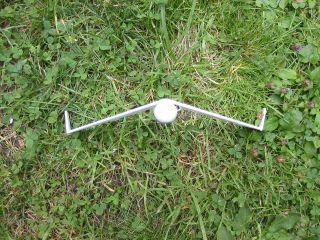
The balsa is extremely high quality. No warping and the edges were very smooth. They were the quality of laser cut fins but did not have the tell-tale burned edges one sees on laser cut fins.
The instructions consist of one page (notes front to back) with hand drawn illustrations to indicate fin construction. The instructions were easy to follow. First, I glued the nose cone in the body tube. Second, I had to glue the rudders to the ends of the fins at a 90 degree angle. After the rudders dried, I turned the fins upside-down and glued the fins together with the rudders facing down. This creates the proper dihedral for the rocket. Once the wing unit is dry, I glued the body tube on the wing, on the opposite side of the rudder, making sure the top of the wing and the edge of the nose cone joint match. Next, all I had to do was add the launch lug to the side between the wing and the body tube. I used wood glue for all the gluing except for CA which I used to glue the wing dihedral together. I did do a little sanding of the fins, rounding out the leading edges and tapering the trailing edges. This was not discussed in the plans, but I just couldn't help myself from doing so. My nose cone appeared a little more blunt than the nose cone featured on the face card.
PROs: An easy, unique kit at Skill Level 1 with quality pre-cut balsa.
CONs: None, unless one wants to complain about the shape of the nose cone.
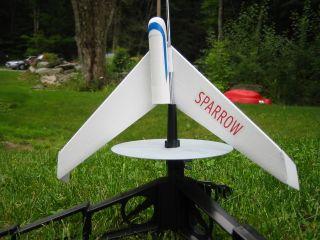
Finishing:
Instructions say to apply a coat of sanding sealer, to then sand, and repeat
the sealer process. I did not want to add weight to a glider, so I just added
primer, sanded, and then gave it two good light coats of Krylon white. It
looked good when I was done. After the paint dried, I cut the decal sheet up.
The decal sheet contains two items: the name "Sparrow", and a blue
window-cockpit design. The decals were nice and strong and did allow me to move
them around on the model once I was done with them. The cockpit is a little
difficult to put on as it has a tendency to wrinkle, but after a little work I
got it to look pretty good. The tailless glider, once finished, is a nice
addition to my fleet. I would rate construction and finishing very high. The
face card features a white rocket, so this is exactly how I painted mine.
Construction Rating: 5 out of 5
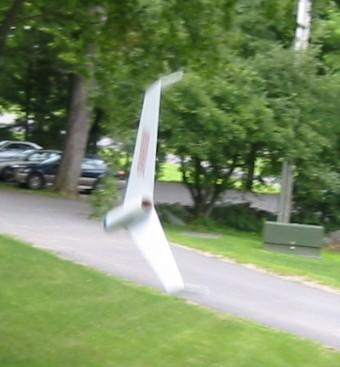
Flight:
The instructions give tips on trimming the glide of the Sparrow before flight.
I tried to trim the Sparrow with clay before painting and found the model a
little nose heavy. After painting, the rocket seemed to be fine without any
trimming, so I decided to go for it.
Luckily, my local hobby shop had a pack of 1/2A6-2s, so I bought the pack and headed out to my launch site. The day was a bit blustery, so I decided to only launch with the 1/2A6s, not the A8-3s I also brought along. Prepping is very easy. There is no need to wadding, and the motor does need to be able to pop out at ejection, so no motor retention is needed.
On the first launch, I lost sight of the Sparrow at ignition, but once I heard the motor pop out, I was able to catch it in the sky. It glided nicely, but was a little nose heavy, so it descended rapidly. On the second flight, I was able to see the rocket ascent, but once the motor ejected, I lost sight of the glider. I was able to find it again to observe the flight. Again, it was nose heavy. I now need to either add some clay weight to the back of the model, or perhaps CA a BB or two towards the back of the body tube to balance it out more. I did notice that the decals began to flake a little after the first launch. I will have to coat the decals with an acrylic finish before I fly the Sparrow again.
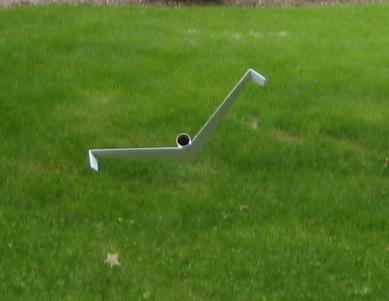
Recovery:
Trimming this model is difficult and may require flying it to observe it longer
than just a hand toss. Other than that, it's a great little model for the
price.
Flight Rating: 4 out of 5
Summary:
PROs: Easy construction, great design, cool glider recovery, and great price
for about $6.
CONs: The Sparrow is a little difficult to watch as it leaves the launch pad. A little hard to trim too, but not that big of a deal. Decals flake slightly after they have been exposed to the heat of the ejection charge.
Overall Rating: 4 out of 5
Other Reviews
- Starlight Rockets Sparrow By Todd Mullin
Brief: The Sparrow is a small flying wing rocket glider that Starlight bills as a "Skill Level 2". I love to launch gliders, so finding one that appeared to be nearly foolproof at such a low cost is a treat! The wingspan of this glider is 11 inches. Construction: The components of the kit came in a poly bag and were in good condition when I opened the kit. The fin ...
 |
 |
Flights
 |
 |